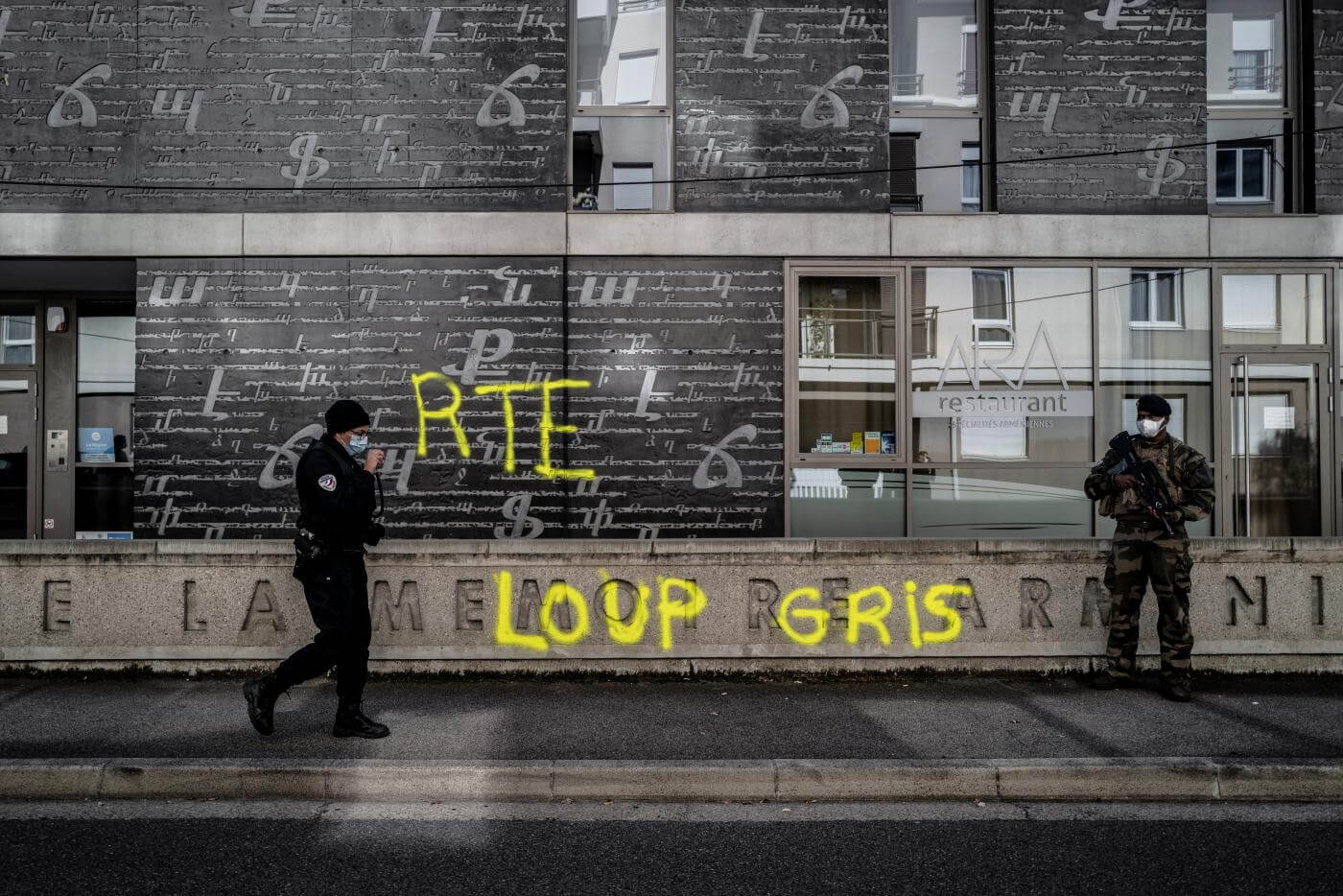France will ban the Turkish far-right, ultra-nationalist group Grey Wolves after the Armenian Memorial Centre in Lyon, which honors the lives lost during the Armenian genocide, was defaced with pro-Turkish slogans. This comes amidst strained bilateral ties between France and Turkey and is only likely to inflame tensions further, even more so because the memorial was defaced with graffiti reading RTE, which represent the initials of Turkish President Recep Tayyip Erdogan.
France’s response comes on the back of recent riots in Lyon, when, according to several sources, demonstrators holding Turkish flags flooded the streets, shouted anti-Arminian slogans, and vandalized the museum dedicated to the victims of the 1915 massacres of Armenians in Ottoman Turkey. The Turkish origin group ‘Grey Wolves’ was held responsible for initiating the chaos. Consequently, in a bid to quell violence and unrest, French Interior Minister Gérald Darmanin outlawed the group.
The Grey Wolves, officially known as Idealist Hearths, was formed by a Turkish politician, Colonel Alparslan Türkes, in the last 1960s. This paramilitary wing of the Nationalist Movement Party (MHP) known for its extreme Turkish nationalistic ideology. Several scholars and left-wing Turkish politicians have labeled it as a “xenophobic, fantastically nationalist, neofascist network steeped in violence.” This ultranationalist group has also spread its wings across Western Europe and several parts of Eurasia, and has a history of violence against the Kurds, Armenians, and Greeks. The MHP is allied with Erdogan’s Justice and Development Party (AKP) in the Turkish parliament.
The link between the members of Grey Wolves and the ruling Turkish party make the incident more alarming. The agitations between France’s largest ethnic Armenian population and Turkish communities have also been tied to the ongoing conflict in Nagorno-Karabakh. While France supports Armenia due to its large Armenian population, Turkey has been helping its oldest ally Azerbaijan. This conflict stirred Turkish protestors in France to launch a “Hunt for Armenians”, which was met by swift reprisal by rights groups such as the International League Against Racism and the Coordination Council of Armenian Organisations in France, who both urged the French government to take stern action and ban the group.
Après les chasses à l’Arménien organisées à #Vienne et à #Décines, le #CNMA & le Mémorial décinois du génocide des Arméniens ont été profanés cette nuit.
— Comité de Défense de la Cause Arménienne - CDCA (@cdcaancfrance) November 1, 2020
Des insultes à l’égard des 🇦🇲 et se référant à Erdogan et à la milice ultranationaliste des Loups Gris ont été tagguées. pic.twitter.com/E05ZJaLIFy
Against this backdrop, France’s already strained relationship with Turkey now seems to have to hit rock bottom. Recently, French President Emmanuel Macron refused to renounce controversial cartoons depicting Prophet Mohammad and asked Erdogan to condemn the murder of the cartoonist. This altercation resulted in the Turkish ban on French products. In addition, France suspended its NATO mission, Operation Sea Guardian, accusing Turkey of violating an arms embargo against Libya. This decision came two weeks after the French blamed the Turkish ships for targeting French warships in the Mediterranean, which Ankara strongly refuted.
France’s moves to tackle radical Islamist groups and separatism are confronted by the accelerated Islamization of the Turkish republic under Erdogan who has not shied away from expressing his desire to raise a “pious generation” in a more devout society. During his 17-year reign, he has constructed thousands of new mosques and Islamic vocational schools, most notably recently converting the iconic museum and tourist destination, the Hagia Sophia, into a mosque. Such actions have only further pitted the two countries’ opposing ideologies firmly against each other.
Le terrorisme n’a rien à voir avec la nationalité ou la couleur de peau, ce que nous combattons c’est l’idéologie islamiste. C’est pour cela que nous dissolvons des associations, que nous multiplions les contrôles et que nous proposons une loi pour lutter contre les séparatismes. pic.twitter.com/xZzcv1GCLS
— Gérald DARMANIN (@GDarmanin) November 2, 2020

